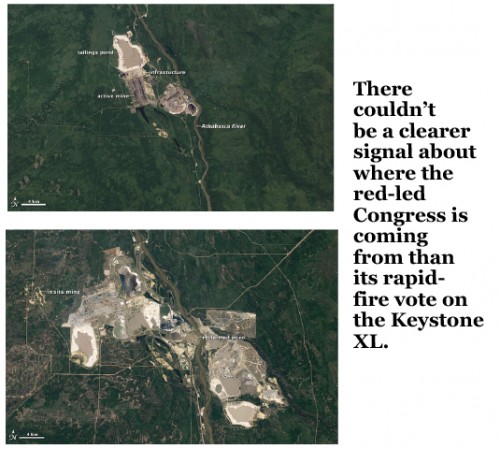“An honest read of climate science doesn’t provide answers that society wants to hear.” – Doug Meyer
A danger we may face with the new red-state led Congress is that over time we’ll become so tired of their banality and the din of their rhetoric that we’ll tune them out, progressively ignoring their destructive initiatives on behalf of the most privileged people anywhere; especially regarding our climate. So let’s look at what the red-state kids have stirred up in their first month on the job leading Congress. Right out of the chute they haven’t been kidding around.
The new Senate has voted against confirming that human activity is “significantly contributing” to climate change, even though that’s what credible climate scientists overwhelmingly believe and it’s also what informed people virtually everywhere know (if you ask me, I think the aliens know it, too). This vote means that our Senate, the most powerful legislative body on our blue Earth, refuses to take a leadership role on the most crucial issue of our time. I hope people everywhere remember this vote and don’t forget the indifference it reveals.
There is of course more. Guess who the new Chair of the Senate Committee on Environment and Public Works is? None other than Senator James Inhofe from Oklahoma. Inhofe is remarkable for his self-chosen mission as a layman to refute the scientific evidence that climate change is human caused. And I’ll give him this much: he may be sincere and he has energetically cobbled together a case that sounds credible to a person who doesn’t know the relevant science from a hole in the floor. In the past he’s functioned as a kind of colorful side show in the Senate, where he’s worked earnestly to inform people (thereby misinforming them).
Now, however, the red-state Republicans have stuck him in the center of their three-ring circus with the following bizarre dynamics: those who have a decent grasp of climate science know that his claims are absurd, while those who are deep in denial or don’t know much may unwittingly believe him. The message from the Republicans here is simple: don’t bother to bring any serious testimony about climate change to the U.S. Senate; this place is a circus now.
What are people outside these narrow rings of right wing influence supposed to make of such a gesture? Consider the countless frightened people across Asia who are dependent on the melting glaciers in Tibet for their river water, and in Africa and elsewhere who are justly fearful of losing their crops to ever widening droughts. Or the distraught farmers in California who are drilling out their own ground water to keep their crops going. They are bound to feel cruelly mocked by our illustrious Senate.
And of course there is the Keystone XL pipeline. Within days after convening, the House of Representatives passed a bill approving the pipeline by a vote of 266-153. Then on January 29 the Senate passed an approval bill of its own by a vote of 62-36. President Obama is expected to veto the final version of the bill (he may or may not approve the pipeline later on).
There couldn’t be a clearer signal about where the red-led Congress is coming from than its rapid-fire vote on the Keystone XL. The pipeline would bring crude oil from tar sands being mined in the vast boreal forests of Canada across the central U.S. to ports on the Gulf of Mexico, where it could be refined and shipped worldwide. (See the photos of the Athabasca tar sands mine in Alberta from the NASA Earth Observatory taken in 1984 and in 2011).
People who favor the Keystone XL think of it as bolstering our energy independence and strengthening our energy industry and providing more jobs, at least during the construction phase. So to them it all seems good. What they do not know, or what they choose to ignore, is the story climate science is telling us: that humans have already discovered more than enough conventional fossil fuel reserves – oil, gas, and coal – to ruin the stability of our climate if they are burned. And that if in addition we discover and burn unconventional reserves of fossil fuels, i.e. tar sands and shale oil, which we are already doing to some extent, the devastation from climate change will be immensely greater.
How much greater? In 2009 the eminent climate scientist James Hansen concluded that if humanity burns all conventional fossil fuel reserves, and in addition all the unconventional fossil fuel reserves, a gigantic feedback loop of greenhouse warming, “runaway” warming, would in time destroy all life on Earth, eventually turning our planet into another Venus (See his book Storms of my Grandchildren, Chapter 10). In 2013 he revised his conclusion: that burning all such fuels would merely leave us with an ice-free Antarctica and make Earth into a desolate planet with no surviving humans (See “Climate Sensitivity, Sea Level and Atmospheric Carbon Dioxide,” 26 September 2013, on Dr. Hansen’s website: www.columbia.edu/~jeh1.)
Could Hansen be off base here and if so how? Well, he could either be mistaken or perhaps just more clear about the timescale for all this, but he’s less likely to be wrong about the eventual end result. We can be confident that burning unconventional fossil fuels is a serious, serious matter.
That is why people who understand the climate science realize that completing the Keystone XL pipeline would be the functional equivalent of turning on the spigot for unconventional fossil fuels; that as a practical matter once that spigot’s turned on others will be too, and once they’re turned on they won’t be turned off until they run dry. If anything approaching that scenario happens, the habitability of our planet for humans and countless other species will be at grave risk. With that in mind consider the efficient and chilling deliberation with which those Republicans voted en masse to ram the Keystone XL pipeline through.
What the hell is going on in those people’s minds?
I’ll tell you this: as frustrating as President Obama’s waffling on the Keystone XL has been over the last three years, it’s been much easier for me to understand where he’s coming from. I can imagine the endless weighing of low-brow political concerns versus doing the right thing, all the prevarications of power that weigh on a chief executive. Although I think he should have nixed that pipeline as soon as he could get his hands on it, I can infer that at least the guy’s got a heart and he thinks things through.
But it’s no simple matter to comprehend why those Republicans are marching in lockstep straight toward a holocaust. At this crucial time in history we need to look into the psychology of their behavior.
***
So here goes.
I began by pulling out my world civilizations textbook and reading up on the Enlightenment. I wanted to know what it was about the Scientific Revolution that so changed the way people look at the world. A big hint came from the pen of Francis Bacon, who lived during the time of Galileo: “Bacon…linked science and material progress in the public mind…Bacon also believed that the pursuit of new knowledge would increase the power of governments and monarchies…his thought in this area opened the way for the eventual strong linkage between governments and the scientific enterprise.” (Albert M. Craig et al, The Heritage of World Civilizations, 2006, pp.643).
There it was: the promise that science would bring prosperity and along with that enhance the stature of governments. That was the deal, and for a long time science seemed to hold up its end of the bargain. But in recent decades the findings of climate science have put a crack in this relationship that is widening it into a chasm. Science is no longer promising the prosperity that the privileged countries of the world have come to expect and the “developing” countries have assumed they could have. It’s also making the governments of those privileged countries look regressive if not ridiculous for their failure to respond to the climate crisis.
The findings of science are now pointing humanity toward a different and more humble way of life that many regard as a bleak and insufferable prospect. I’m beginning to wonder if many Americans aren’t on the verge of walking away not just from the findings of the climate and environmental sciences but from the authority of science itself.
Certainly for many of us, I hope most, science remains the lodestar of our culture. While we don’t necessarily believe it can explain everything that is of value, such as spirituality, we do accept what it can explain, and we also accept that whatever direction science takes us in, that is where humanity will ultimately go.
To a degree walking away from science – regressing to a pre-scientific world view – isn’t a new phenomenon in America. Over a century ago our religious fundamentalists, chiefly evangelical Christians, embarked on their own march away from science, objecting to the evidence it had amassed in favor of evolution, which discredited a literal reading of the biblical creation story. And the fundamentalists are still around in large numbers, providing a solid foundation of support for, guess who, the right wing Republicans. These believers pervade the Bible Belt South and lots of them live in the fossil fuel states of Texas, Oklahoma, West Virginia, Kentucky, Louisiana, and Wyoming.
My personal experience is that fundamentalist Christians, despite certain unfortunate biases, are generally nice people who are often helpful to others in need. They’re convinced that their biblical worldview gives their lives meaning that a life immersed in what they see as godless scientific materialism cannot. Obviously I believe they are mistaken in this, but I can’t argue with their sincerity. Sadly, however, their denial of evolution sets them up for denial of climate change and its ultimate effects. And also sets them up to be manipulated by the right wing politicians who don’t have their best interests and the best interests of their families at heart.
***
To write about what motivates a group is an uncertain endeavor. I admit that what I say here about certain powerful people is speculation. However, the typical explanations we hear for maladaptive responses to climate change, namely psychological denial, cognitive dissonance, and simple greed, have become inadequate.
In the late 1920s and 1930s the psychiatrist Carl Jung (1875-1961) spent much time exploring and then describing the emergence of a new and troubling ego state that he was finding in modern people. Jungian analyst Murray Stein gives us a summary of Jung’s thinking: “Thus the ego is radically inflated in the modern person and assumes a secret God-Almighty position…The ego becomes the sole arbiter of right and wrong, true and false, beautiful and ugly. There is no authority outside the ego that exceeds it. Meaning must be created by the ego; it cannot be discovered elsewhere. God is not ‘out there’ anymore, it’s me!…
“Jung believed this…to be an extremely dangerous state of affairs for the obvious reason that an inflated ego is unable to adapt very well to the environment and so is liable to make catastrophic errors in judgment…Anything goes! If I want to do it and I figure I can get away with it, it must be okay…the ego is easily led to indulge in the…lust for power and its wishes to gain total control of the world…this hubris is reflected in the various social and political catastrophes of the twentieth century…the ego can consider unlimited possibilities of action. This does not mean all modern people are sociopathic, but the doors for such a development are wide open. And the worst cases might be those that look the most reasonable – the ‘best and brightest’ who think they can calculate an answer to all questions of policy and morality.” (Murray Stein, Jung’s Map of the Soul, 1998, pp.183-184).
I suspect that the talented, intensely ego-centered people Jung described are drawn to the centers of  power in Washington, D.C, and New York City like nowhere else: to Congress, to high positions within the Executive branch, to influential lobbying firms, to Wall Street, and to top executive positions within multinational corporations. These are all places that are aglow with power. These are people, nominally of both parties, who are driven to acquire and then to protect and preserve a base of power within these elite institutions. Once acquired, they see this base of authority and influence as an enormous personal achievement and identify their egos with it; they don’t possess the modesty to view it as a blessing that they may need to relinquish at any time.
power in Washington, D.C, and New York City like nowhere else: to Congress, to high positions within the Executive branch, to influential lobbying firms, to Wall Street, and to top executive positions within multinational corporations. These are all places that are aglow with power. These are people, nominally of both parties, who are driven to acquire and then to protect and preserve a base of power within these elite institutions. Once acquired, they see this base of authority and influence as an enormous personal achievement and identify their egos with it; they don’t possess the modesty to view it as a blessing that they may need to relinquish at any time.
The dictates of their egos easily overrule any scientific findings that prove inconvenient. They don’t much care what will happen 50 years from now or even ten years from now if it’s not about them. Although they do love their own families and try to accumulate enough wealth to protect their children and grandchildren come what may, they don’t focus much on what will actually happen to their fellow citizens in the future, much less to vulnerable people world-wide. Nor have they internalized a moral obligation to surrender their own interests in order to take care of such people.
While there’s no way to know how many of the people in top positions are in this ego state, my guess is plenty of them. And here is the thing: if enough of them simultaneously think that their authority is under threat, as seems to be the case with climate change, then they’re fully capable of making catastrophically unwise decisions in order to preserve their own interests, decisions that do untold harm to billions of people and countless creatures and ecosystems worldwide.
Now for the Congressional Republicans specifically. I suspect that a critical mass of them now in control of Congress, despite the religious rhetoric many spout to their constituents, are devoted only to their own turbo-charged selves. And that they have enough clout to whip the others in their party into line. Although some of them may be sincere in their climate change denial, those with the gargantuan egos are too smart and educated not to know how dangerous climate change is. This means that their propaganda strategies, designed to engender doubts within their own constituents as to whether climate change is human caused, are largely disingenuous. And I would not be amazed if a number of those self-possessed Republicans who hail from fossil fuel states have no intention of ever cooperating with any federal effort to phase out fossil fuel emissions, because they figure that enough of their constituents are ready to walk away from the scientific tradition right along with them.
I hope I’m mistaken in what I’ve just said regarding these people; I’d like to think better of them than this. But if I’m correct we need leaders who know how to be selfless and idealistic in an urgent situation: precisely the qualities these people do not possess.
Other sources: Puneet Kollipara, 1/21/15, “”Wrap-up: U.S. Senate Agrees Climate Change is Real – But Not Necessarily That Humans Are Causing it,” news.sciencemag.org; Emily Atkin, 1/22/15, “New Senate Environment Chair Gets His Gavel, Goes on Rant Arguing Climate Science is a Hoax,” thinkprogress.org; Coral Davenport, 1/29/15, “Senate Approves Keystone XL Pipeline Bill, Testing Obama,” www.nytimes.com.
SCOTT THOMPSON is a regular contributor to the Zephyr.
He lives in Beckley, WV.
To read the PDF version of this article, click here.
To comment, scroll to the bottom of the page.
Don’t forget the Zephyr ads! All links are hot!










